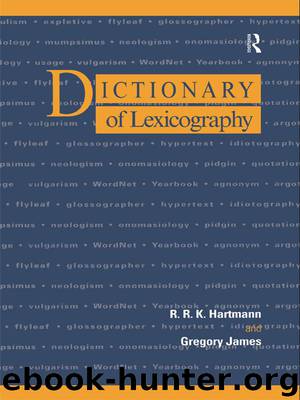Dictionary of Lexicography by James regory & regory James

Author:James, regory & regory James
Language: eng
Format: epub
Publisher: Taylor and Francis
Published: 2002-01-03T16:00:00+00:00
ISO 1990.
language dictionary
A type of REFERENCE WORK which provides linguistic information about the total vocabulary covered. The prototype of this dictionary is the monolingual GENERAL DICTIONARY, which may be viewed in contrast with the ENCYCLOPEDIC DICTIONARY or the TERMINOLOGICAL DICTIONARY.
language engineering
The harnessing of technology to the development of language-related activities, products and services.
The Language Engineering Directory (P.M.Hearn), Madrid, 1996; Language Engineering: Progress and Prospects (C.Watson, LINGLINK), Luxembourg, 1997.
language for special purposes
LANGUAGE FOR SPECIFIC PURPOSES.
language for specific purposes
In language teaching and LSP LEXICOGRAPHY, the variety of the language (‘special language’) used by experts in a particular subject field. Textbooks for teaching and reference books for explaining the ‘registers’ of such TECHNICAL LANGUAGES or ‘sub-languages’ take into account the specialist knowledge (e.g. active and passive VOCABULARY) of the target learner-user and make a deliberate effort to select the HEADWORDS and couch the definitions according to the criteria of familiarity and frequency.
CORPUS LINGUISTICS, ESP DICTIONARY, LSP DICTIONARY. WORKS
Robinson 1980, Sager et al. 1980, Diab 1989, ISO 1990, James et al. 1994, 1997, James & Purchase 1996, Minaeva 1996.
language information LINGUISTIC INFORMATION.
language learning
The process of mastering a language, either the mother tongue or a second/foreign language. A distinction can be made between ‘learning’ (in a formal environment, e.g. a school) and ‘acquisition’ (in an informal setting). There is a lack of awareness of the needs of different learners for different types of reference works, e.g. monolingual versus bilingual, alphabetical versus thematic, general versus specialised.
INTERLANGUAGE, LEARNER’S DICTIONARY, PEDAGOGICAL LEXICOGRAPHY.
Nation 1989, Johnson 1995.
language maintenance
The totality of activities aimed at preserving a minority language, e.g. an INDIGENOUS LANGUAGE vis-à-vis a colonial language. Dictionaries, monolingual or bilingual, may have a role to play in codifying the minority language and giving it cultural status.
CULTURAL DICTIONARY, EXOGLOSSIC LANGUAGE.
language planning
The totality of activities aimed at regulating the use of a language, often linked to national policies. Such control is usually imposed centrally by governmental or quasi-governmental agencies, such as ACADEMIES or language policy bureaux. Measures may include banning FOREIGNISMS, coining NEOLOGISMS and technical TERMINOLOGY, controlling the media and redirecting education policies.
CENSORSHIP, CULTURAL DICTIONARY, LANGUAGE RIGHTS, STANDARDISATION.
Kurtböke 1996, Raadik 1996, Kaplan & Baldauf 1997.
language policy
A set of governmental decisions on the relative priorities of the use of languages in a state, for the purposes of employment, education etc., which can influence the number and types of REFERENCE WORKS produced and used.
LANGUAGE RIGHTS.
language purification
The deliberate attempt to achieve PURISM in a language.
language purism PURISM.
language reform
The totality of activities aimed at improving the conditions in which a language can develop and be taught, e.g. through SPELLING REFORM.
STANDARDISATION.
language resource database
DATABASE.
language rights
The exercise and protection of the fundamental right to use the language of one’s choice.
LANGUAGE MAINTENANCE, LANGUAGE POLICY. Greek). and
Tollefson 1991, Phillipson & Skutnabb-Kangas 1995.
language standardisation
STANDARDISATION.
language teaching
The practice of creating an environment conducive to LANGUAGE LEARNING by the use of appropriate instructional methodologies.
APPLIED LINGUISTICS, INTERLANGUAGE, LANGUAGE ARTS, LEARNER’S DICTIONARY, PEDAGOGICAL LEXICOGRAPHY. effectiveness ILLUSTRATIONS, COMPRESSION
Hartmann 1992a, Johnson 1995.
language typology
A branch of LINGUISTICS concerned with the classification of languages, based on structural similarities rather than genetic affiliation. The nature and types of reference works reflect the diversity of language types, e.
Download
This site does not store any files on its server. We only index and link to content provided by other sites. Please contact the content providers to delete copyright contents if any and email us, we'll remove relevant links or contents immediately.
The Art of Coaching Workbook by Elena Aguilar(51171)
Trainspotting by Irvine Welsh(21644)
The Secret History by Donna Tartt(19058)
Twilight of the Idols With the Antichrist and Ecce Homo by Friedrich Nietzsche(18626)
All the Missing Girls by Megan Miranda(15965)
Cat's cradle by Kurt Vonnegut(15339)
Ready Player One by Cline Ernest(14645)
Talking to Strangers by Malcolm Gladwell(13350)
Fangirl by Rainbow Rowell(9229)
The remains of the day by Kazuo Ishiguro(8981)
The Compound Effect by Darren Hardy(8949)
Thirteen Reasons Why by Jay Asher(8894)
Tools of Titans by Timothy Ferriss(8369)
Periodization Training for Sports by Tudor Bompa(8254)
Wonder by R. J. Palacio(8100)
The Lover by Duras Marguerite(7893)
A Court of Wings and Ruin by Sarah J. Maas(7822)
Change Your Questions, Change Your Life by Marilee Adams(7762)
The Complete Stick Figure Physics Tutorials by Allen Sarah(7366)
